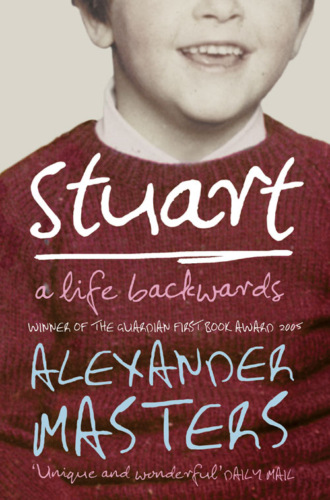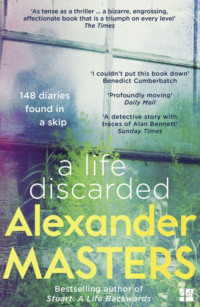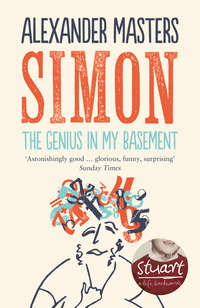
Полная версия
Stuart: A Life Backwards
On this day, however, something was wrong.
‘Fuuuccking tosshhers, open up!’ burbled the blotchy-faced drunk toppled against the front door. His face came attached to a grizzled beard; a finger jabbed at the reinforced glass. ‘What you fuccchking cloasshh-ed for? Gimme me fuucchhking tea!’
I slipped in the staff entrance and stared through to the dining hall. The man had a point. At this time of day it should have been open and full of fifty fellow smackheads, crackheads, psychotics, epileptics, schizophrenics, self-harmers, beggars, buskers, car thieves, sherry pushers, ciderheads, just-released-that-morning convicts, ex-army, ex-married-men-with-young-children-who’d-discovered-their-wife-in-bed-with-two-members-of-the-university-rowing-team-at-the-same-time. Out in the courtyard would be the merry sound of baying knee-high dogs with names like PayDay and Giro and Dregs.
Instead, the hall was empty. Blotchy was abusing a deserted room. I daringly let myself in and looked through to the blue glow of the kitchen; not even Sue, the indomitable cook, was at work. The industrial fridge and fly-killer tubes droned gently, like ship engines. The only human sound was the new secretary from North Dakota, tapping away in one of the upstairs rooms.
Wintercomfort was a good organisation. Set up in 1989 by a local businessman horrified at the number of people he saw sleeping in doorways when he walked back home from work, it was fresh and crusading and full of pep. Wintercomfort excelled at the job no one else wanted to do – acting as a last safety net for the worst street cases, calming the most violent, soothing the suicidal, comforting those about to be sectioned in the desolate wards of ‘Hospital Town’, encouraging the hopeful and the full-of-plans and cleaning up Cambridge. By giving the homeless a supportive place to go during the day, it meant they were less frustrated, less bored, less desperate and hence less often blocking up the pavement and less anti-social.
But today everyone had vanished. I crept out of the dining hall as if I were the thief, and the intruder, and the pariah, and up the stairs.
The secretary, pale and shaken, not yet one month into the job, explained what had happened. Yesterday, the police had raided. Six cars and vans had banged to a stop on the pavement outside; six car- and vanloads of men and women in uniforms and crackling radios had shouldered their way in, spreading out through the dining hall, arresting left and right, then surging up to the admin and outreach and funding departments, separating staff into empty rooms, refusing to answer questions, demanding statements. Even she, with the breeze of North Dakota still in her hair, had had to give one.
That afternoon, the police had arrested the director, Ruth Wyner, on suspicion of ‘knowingly allowing’ the supply of heroin.
A week later, they would take in her deputy John Brock as well.
For the last five months, among the roof tiles of Christ’s College boathouse across the road – halfway down, and three feet in – a tiny surveillance camera poking through the tiles had been filming the charity premises. In the Wintercomfort forecourts, eight people had been clearly recorded selling each other £10 bags of heroin.
Downstairs, I could hear the drunk running out of steam. ‘Fuuaarkeeeen tttsssseeeee. Yoouh, fuuaarkeen gimmuuheee!’ His lips slid up and down the glass in a smear of spittle, but he perked up when he saw me approaching. ‘Bout fuccking time! Where you been? It’s me fucking right to have me tea! I exschpect you to stay open later now, to fucking make up for it!’
I wrenched open the door. Ruth and John were kind, good, thoughtful people, passionately concerned about the welfare of the impoverished and the disenfranchised.
‘Fuck off, pisshead!’ I said.
The charity held an open meeting: wine in stemmed glasses, colourful things on crackers called – in the playful, roundy typeface of the poster – ‘nibbles’. The charity governors, the charity’s friends, the volunteers, neighbours. Everyone tinkled around the homeless dining hall.
A former Labour Cambridge mayor, a no-nonsense political bruiser, called the gathering to silence. ‘Order, order, ORDER! WILL YOU PLEASE BE QUIET!’
She then began the process that would end up taking the next year of my life: she started to turn us into a protest movement. I felt, everyone in that room of pretty wine glasses felt, appalled and personally affronted. The arrests of Ruth and John were no longer just a matter of helping the less fortunate. They had been an attack on Us. This was the closest most of us had come to feeling what it was like to be treated with public loathing. With shock, we realised we now had something in common with the homeless. How dare the police, the Crown Prosecution Service, the Home Office.
Indeed, their anti-drugs policy was regarded by many as a model of good practice. The judge himself, at the trial, had admitted there was no suggestion that Ruth or John or any other member of the Wintercomfort staff had in any way been involved in the deals that had been filmed. There was also no evidence to show that either Ruth or John had ever seen any deal and not immediately done something to stop it. In fact, when Ruth or John rang the police to get them to remove a suspected dealer from the premises, the police had often not even bothered to show up. They also did not turn up, though invited, to charity drugs policy meetings.
Ruth and John’s crime was, in effect, twofold: first, that their anti-drugs policy had not been successful; second, that they had disagreed with the police about the best way to make it better. The second aspect centred around their policy of confidentiality towards their clients, a policy regarded as essential to getting these peculiar, suspicious and often violent people’s trust so that they could be encouraged to face their addiction, take advantage of public services and come off drugs, stop begging, give up the streets and leave the rest of us law-abiders alone. Ruth and John – but particularly Ruth, as boss – had refused to give to the police the names of people they had banned from the premises for suspected drug use, which was often based on little more than an overheard conversation or a suspicious gesture near the downstairs toilets. This, the judge and jury, who never visited Wintercomfort, had dismissed as being nothing more than a deliberate scam to prevent police getting incriminating evidence.
The open meeting was being held today because yesterday Ruth and John had been sentenced.
John had been given four years in prison; Ruth, five.
A hundred wonderful ideas swirled around that meeting hall: demonstrations, vigils, international tribunals, questions for Parliament, a banner on Canary Wharf, a picket of homeless people outside the House of Commons, endless letters to The Times. Relieved by the purity of our purpose, we let rip.
‘Everyone running homeless charities must present themselves to the police and demand to be arrested,’ announced one humorous man, who ran such a charity himself. ‘If Ruth and John are guilty then so is everyone else. It is a crime for us to remain free!’
‘That’s elitist!’ snapped back a Socialist Worker, dressed in solid black. ‘Why should you be allowed to get arrested when the rest of us can’t?’
My two favourite ideas were sinking the Cambridge boat at the Oxford-Cambridge boat race and a march of homeless people on Number 10 (the big trouble with this, I realised, would be to keep the marchers from ambling off down irrelevant side streets, falling in the Thames, etc., but I figured you could probably coax them into a reasonable line by driving a vanload of Special Brew cans in front, just out of reach).
A lady with a silk headscarf observed wisely that as the undercover operation had also depended on two officers dressing up as tramps and buying heroin from dealers during lunch – a subsidised meal of spaghetti and meatballs, which, in order to lend verisimilitude to their plot, the officers had shared – the police could be sued for defrauding the charity.
The bursar of St John’s College – lawyer, mathematician, former Conservative mayor of the city – wondered about sending writing paper to Ruth and John: was it better to put it in the post sealed, in bundles of three pads, or unsealed, in single sheets?
Another lady suggested throwing stones at the judge’s windows. But each idea ended in the discovery that words are just words and jail bars are made of metal.
Everyone agreed that we must send Ruth and John dozens of books to keep them occupied until we got them out – as we surely would.
It was at this point that a soft voice, vaguely familiar to me, butted in from the front row.
‘Excuse me, but that won’t work.’
The green bomber jacket struck a chord, too.
‘Why not?’ demanded our chairwoman.
‘They won’t fit in the box.’
‘Box?’
‘For the inmate’s belongings. Alright, in Whitemoor and Long Lartin, in them top-security jails, you’re also allowed a piece of carpet, what don’t fit in the box, and a budgie or a canary, and obviously the cage ain’t going to fit in the box. Books won’t fit in the box. The screws’ll chuck ’em out.’
It was Psycho. Knife Man Dan. Stuart Shorter. Wearing the same clothes as when I’d first seen him round the corner from Sainsbury’s, a year before.
‘So each inmate has a box?’ someone asked.
‘Two boxes. One in possession and one in reception. I’m not being funny, but you should know about boxes if you’re going to have a campaign.’
The most important thing we could do, he persevered, was write letters, send stamps, and not expect to get replies. Letters go missing. Depression comes.
Stuart stood as he was talking. The chairwoman demanded it, and it appeared to cause him a little trouble to find his balance. He was about five foot six, bow-legged and anaemic. His hands he kept shoved in his jacket pockets like a man on the sidelines during a cold football match. He raised his voice for a few words when people at the back called out ‘Louder!’ ‘Speak up!’ then forgot himself and lapsed back into his regular murmur. But he would not stop talking. It was as though, having tasted at last what lack of diffidence was like, he was determined not to lose a single second of the pleasure.
‘Don’t expect the visits to go well, neither. See, because visits is only two hours every two weeks, when you’re a prisoner you build yourself up to such a pitch that when the visit comes it can’t go right. It’s not –’ directing himself at John’s wife – ‘that he don’t love you, it’s just that visits is all what you live for when you’re inside.’
‘Because if most men are true,’ he observed a moment later, ‘when they go back to their cells that’s when you know the loneliness. You can’t take it. You know the loss.’
And about the stone throwing, Stuart was adamant. ‘I understand the old dear there is feeling rageous, but prison is all about having privileges and taking them away. If you break the judge’s windows it’s Ruth and John what will suffer.’
‘How can they suffer more?’ an indignant man called out. ‘They’ve taken away their freedom and their dignity, what else is left?’
‘Their wages,’ replied Stuart.
A silence.
Then a bemused female voice from the other side of the room: ‘Prisoners get wages?’
Конец ознакомительного фрагмента.
Текст предоставлен ООО «ЛитРес».
Прочитайте эту книгу целиком, купив полную легальную версию на ЛитРес.
Безопасно оплатить книгу можно банковской картой Visa, MasterCard, Maestro, со счета мобильного телефона, с платежного терминала, в салоне МТС или Связной, через PayPal, WebMoney, Яндекс.Деньги, QIWI Кошелек, бонусными картами или другим удобным Вам способом.




